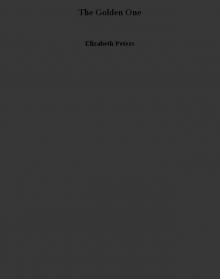- Home
- Elizabeth Peters
A River in the Sky Page 3
A River in the Sky Read online
Page 3
“No. Perhaps you would prefer that I resign,” Ramses said.
“What the hell do you want from me, an apology?” Reisner clamped his teeth down on the stem of his pipe. Then he said suddenly, “You probably think I’ve been a little hard on you these past weeks.”
“No, sir.” The question almost surprised him into a truthful answer. Ramses was used to criticism. His father was a hard taskmaster; his frequent outbursts of temper had earned him the Egyptian title of Father of Curses. But Emerson doled out praise as readily as blame, and his shouts of laughter were as frequent as his curses.
Fisher let out a whinny of amusement. “Don’t take it the wrong way, Ramses. George is afraid your mother will scold him if anything happens to you.”
Ramses’s jaw dropped. “What does my mother have to do with this?”
“He promised her he’d keep you out of mischief,” Fisher said, with a smile that held a certain amount of malice.
It would have been hard to say who was more outraged, Reisner or Ramses. Ramses was too infuriated to speak, which was just as well. Reisner gave Fisher a hard stare. Then he let out a sudden bark of laughter.
“The truth is,” he said, “your father intimidates me, but your mother absolutely terrifies me.”
Fisher joined in his laughter. Ramses was not amused. “With all respect, sir, I am not a child.”
“Oh, for heaven’s sake, don’t be so touchy,” Reisner said irritably. “If I had any complaints about you or your work you would have heard them. All I’m trying to do is find out what the hell is going on. We had no such problems last year. You are the only one of us who has been physically attacked. It smacks of a personal vendetta.”
“But I was here last year too,” Ramses pointed out. “And I’ll be damned if I can think of anything I’ve done lately to arouse resentment.”
“I can’t think of anything either,” Reisner admitted. “You’re as familiar with the mores and sensibilities of Middle Easteners as I am.”
“More so,” Fisher murmured.
Reisner acknowledged the truth of the statement with a wry smile. “Have you any suggestions, Ramses?”
Ramses shrugged. “Somebody doesn’t like my face. I’m not trying to make light of the situation,” he added. “It’s just that I haven’t any sensible explanation.”
They sat in silence for a time. Finally Reisner said with a sigh, “Neither have I. Just avoid solitary strolls from now on, will you? And—er—you needn’t mention these incidents when you write the family.”
“I’ve no intention of doing so.”
“Good. Put some alcohol on that cut before you go to bed.”
It was a dismissal, which Ramses was happy to accept. Lying awake on the hard cot, he went over the conversation and began to see the humor in it. He wasn’t the only one under his mother’s metaphorical thumb. It was a large thumb attached to a very long arm.
Something else struck him now that he had leisure to think rationally. A personal vendetta implied a personal enemy, but it needn’t be a new one. He had acquired a few over a short and misspent life; his parents had acquired even more. Did one of them bear a grudge strong enough to follow him here? He began going over the list but fell asleep before he had got halfway through.
I DID NOT DOUBT that Nefret’s concern for her brother was genuine, if unfounded, but I suspected she was exaggerating her distress in order to get her own way. Owing to Emerson’s obduracy we had not settled on our plans for the winter season. Having been banned from the Valley of the Kings by the Antiquities Service, Emerson refused to accept any other site, though several had been offered him. He had spoken vaguely of returning to Nubia, where we had excavated before. Nefret did not want to go back to Nubia. (Neither did I.)
“Well,” she declared, “I don’t really give a curse about the Ark of the Covenant or Major Morley. I am worried about Ramses. You know how he—”
“Yes,” I said, with a sigh. “I do know.”
“I am going to write to him at once.” Nefret’s chin set in an expression I knew only too well. “And demand that he reply by return mail.”
“That may take weeks,” I said.
“Then the sooner someone gets at it, the better.”
She closed the door behind her with ominous softness.
“Now then,” I said, fixing Emerson with a stern look. “Out with it. You have not told me everything.”
“I didn’t want Nefret to hear.”
“Why not?”
Emerson got up from his desk and tiptoed to the door. That is to say, he was under the impression that he was tiptoeing. Seizing the handle, he flung the door open, peered suspiciously into the hall, and closed the door before returning to his chair.
“What you know of the matter thus far, Peabody, might be deduced by any informed person. What I am about to tell you is a state secret, known only to a few. It must go no further.”
Emerson’s is not a countenance that lends itself to deception. The furrowing of his noble brow, the slight compression of his well-cut lips, and, most particularly, the movement of his hand to his chin, which he is wont to stroke when in thought, indicated that he was in deadly earnest.
“You have my word, Emerson,” I replied, as earnestly. “And may I add that the confidence you have displayed in me…I will say no more.”
“Indeed?” The sobriety of Emerson’s countenance relaxed into a smile. “Well, my dear, I take you at your word. To answer your question: Morley is an additional complication to a witches’ brew of a situation. If he starts digging around the Temple Mount he is likely to stir up trouble with the Jews and the Moslems, both of whom consider that a holy site. Someone needs to keep an eye on him and try to prevent him from doing something stupid.”
“And that someone is you?”
“I have a legitimate excuse for protesting his activities, Peabody, on purely professional grounds. He’s bound to make a mess of the excavation, but until he does so there is no legal way of preventing him from going out there. What concerns the government is another matter entirely. The fact is, I spent only a few minutes with His Majesty. After the usual exchange of courtesies he left me to the Director of Military Intelligence and another individual, whose name was never mentioned.”
“How extraordinary.”
“It was a most extraordinary conversation, Peabody. These intelligence people—well, you know how they are, seeing plots and conspiracies all over the place. It seems there have been rumors of an uprising—not a violent affair like the Mahdist Revolt in the Sudan, but a carefully planned long-range project that may be years in the making. The object is the expulsion of foreigners from the Middle East and the creation of an Islamic state in Syria-Palestine.”
“Expulsion?” I repeated. “That is a rather tame word. Are you talking about a jihad?”
“It may come to that eventually, Peabody. At the present time, military intelligence is chiefly concerned with the part Germany is playing in the region. It has been ten years since the All-Highest, as his fawning subjects call the Kaiser, visited Damascus and Jerusalem and declared himself the defender of Islam. The Turks aren’t naive enough to believe his high-flown rhetoric, but they will use him to serve their own purposes. German agents are swarming all over the region, thinly disguised as explorers, engineers—”
“And archaeologists?”
Emerson nodded, and I exclaimed, “We are doing the same, of course. Archaeologists make excellent spies. Please don’t tell me that George Reisner is secretly working for British intelligence.”
“Then I won’t. Come now, Peabody. In the first place, Reisner is American, with no loyalties to Britain. In the second place, he is the least likely individual of my acquaintance to let politics distract him from his work. Speaking of distraction, Peabody, you’ve done it again. Do you want to know why the War Office is interested in Major Morley?”
“I suppose they suspect him of being a German spy,” I said with a sniff.
Emerso
n’s superior smile vanished. “Curse it, Peabody, how did you know that?”
“Logical deduction, Emerson. The War Office instigated Morley’s visit to us; the War Office doesn’t give a curse about inept excavations; the War Office is obsessed with spies; ergo, the War Office suspects Morley of being one. A spy, that is to say. Utter nonsense, of course. I trust you informed them to that effect?”
“I haven’t had a chance to do so as yet. I had planned to go up to London tomorrow.”
“I will go with you.”
“You have not been invited, Peabody.”
“Nevertheless, I will go.”
“Logical deduction informed me that you would say so,” said Emerson.
WE CAUGHT AN EARLY TRAIN next morning. Finding ourselves alone in a first-class carriage, Emerson took advantage of the opportunity to explain to me the organization of the military intelligence services, and the meaning of various confusing initials. The DMO was the Director of Military Operations, which had, at the present time, several subsidiary branches. MO2 was the branch assigned to cover Europe and the Ottoman Empire, and the only one that concerned us. Emerson would have gone on to tell me about the other branches, but fortunately several passengers got into the carriage at our next stop and refused to listen to Emerson’s strong hints that they go away. In fact I had heard all I needed to hear. Men like to create unnecessary organizations and give them impressive or mysterious names; this usually ends in increased confusion, and should therefore be ignored.
The new War Office building was on an imposing height in Whitehall, across from the old Admiralty. Emerson was expected, for he had telegraphed earlier. I was not expected. There was some little discussion, which I ignored. I had worn my second-best summer hat, trimmed with roses, and a new costume of crimson silk (crimson being Emerson’s favorite color), and I suppose I made a rather unusual figure in that bastion of male supremacy. The men, even the clerks, might have ordered their somber black suits and their gray cravats from the same tailor and haberdasher.
Since Emerson refused to budge a step without me, MO2, and even the DMO, were forced to concede. An extremely nervous young person escorted us to an impressive office on the second floor, where we were met by an equally nervous young secretary. He began twittering at us but was almost instantaneously replaced by the DMO himself, General David Spencer, who came bursting out of his office.
“Mrs. Emerson, I presume,” he said, with a (very) slight bow. “I was not expecting you.”
I studied him with some interest, since I had never met a DMO before. A long, sagging chin was more or less balanced by an unusually high forehead. Under heavy brows a pair of muddy brown eyes regarded me without plea sure.
“I believe I can provide a useful viewpoint,” I explained, switching my parasol from my right hand to my left and offering the former. “I felt it my duty as a loyal servant of the Crown to be present.”
A poorly suppressed gurgle of amusement from Emerson rather destroyed the solemnity of my statement and wrung a critical look from Spencer.
“Come in, then,” he said grudgingly.
There was another person in the office, a slight, unimposing young man with protuberant blue eyes and a brown mustache. He rose when I entered and politely held a chair for me. I assumed he was the unnamed gentleman to whom Emerson had referred. By that time I had become a trifle impatient with unnecessary mystery, so I introduced myself.
“Mrs. Emerson. How do you do?”
“This,” said Spencer, forced into feeble civility, “is Mr. Smith.”
“No, it isn’t,” I said, arranging my skirts and my parasol. “His name is Tushingham, and I met him two years ago following a lecture he gave at the Royal Academy of Science. How are your botanical studies progressing, Mr. Tushingham?”
Over a chorus of snorts from Spencer and chuckles from Emerson, Tushingham said, “I did not presume to assume that you would remember me, Mrs. Emerson. Our encounter was fleeting, to say the least.”
“You mean you hoped I would not remember you. Never fear, Mr. Tushingham. My discretion is well known. Now let us not waste time, you probably have other matters to attend to and I mean to do a little shopping while I am in town. Major Morley is not a German agent.”
The general dropped heavily into a chair and stared at me. Tushingham seated himself and stared at Emerson.
“Does the Professor agree?”
“Oh, certainly,” said Emerson, standing behind my chair. “He is a common garden-variety adventurer. Not that he isn’t capable of making mischief. His notion of proper archaeological methodology—”
“What about the other fellow—Panagatopolous?” demanded the general.
“Panagopolous,” I corrected. “If he is secretly working for Germany, or any other government, he is the finest actor I have ever seen, on or off the stage. You know, of course, of his role in Morley’s project.”
“We investigated his background,” Tushingham said. “In his native Greece he is considered to be part of the lunatic fringe of biblical scholarship—harmless and possibly mentally disturbed. I—that is, we—assume Morley is using him and his bizarre theories as a rationale to mount an expedition.”
“I am certain that is the case,” I replied. “As for Morley, my husband and I are of the same mind concerning his motives. He isn’t the first treasure hunter to be enticed to the Holy Land.”
“Quite,” said Emerson. “Shapira, Parker—”
He would have gone on and on, and I was in a hurry to get to the shops, so I interrupted. “Religious fanaticism and greed, singly or in combination, have been responsible for a number of explosive incidents in Jerusalem. One needn’t invent German spies to explain this latest project, or wish to prevent it.”
Tushingham leaned back in his chair, ran his forefinger along his mustache and shot the general a meaningful glance. I had the distinct impression that he shared our opinion but had failed to convince his obsessed superior.
“Morley has raised a great deal of money from various wealthy, gullible individuals,” Emerson said. “Surely that constitutes fraud, or at the least—”
“I’m afraid not,” I said. “In our free society people are allowed to spend their money as foolishly as they like. You are wandering from the point, Emerson, if you will excuse me for saying so.”
General Spencer leaned forward, his elbows on his desk and his hands clasped. “And what, Mrs. Emerson, is the point?”
I told him.
“HE STILL BELIEVES MORLEY is working for the Germans,” I said as Emerson and I left the building. “Goodness, how dull these military persons are. Once they get an idea into their heads it is impossible to get it out. Mr. Tushingham, now—”
“Why didn’t you tell me you knew Tushingham?”
This was such an unjust reproof I realized Emerson was in a surly mood—possibly because I had removed him from the general’s office before he had a chance to enlarge upon his opinions. He had not offered me his arm. I took it and leaned upon it and replied, not to the question itself but to the annoyance that had prompted it.
“The lecture was on new varieties of wheat in the Golan Heights, Emerson. You refused to attend it because, as you so pithily put it, varieties of plant life are only of interest to you when they are on your dinner plate.”
“Hmph,” said Emerson. “He’s no damned botanist, is he?”
“Oh, yes, and a good one. Wasn’t it you who mentioned that exploration and archaeology make excellent cover for spies? The same is true of other scholarly professions—botanists, geologists, even ornithologists. They provide a legitimate excuse for persons to poke their noses into places where they might not otherwise—”
“I did point that out,” said Emerson between his teeth. “So you needn’t lecture me about a subject with which I am thoroughly acquainted.”
His point was valid, so I abandoned the subject. “There is a cab, Emerson.”
“So I see.” Emerson gestured, and the driver pulled in
to the curb and stopped.
“Fine day, sir and madam,” he said, raising his whip in salute.
“Hmph,” said Emerson, helping me in. “Take us to Victoria Station.”
“By way of Harrods,” I said. “I have a great deal of shopping to do before we leave for Palestine.”
Chapter Two
FROM MANUSCRIPT H
From where Ramses stood at the top of the mound he could see some distance across the plain. It was a country of rolling hills and peaceful valleys, fields of grain laced by streams whose water caught the sunlight in a shimmer of sparkles, vineyards and groves of olive and fig trees. On the eastern slope of the hill a cluster of nondescript buildings marked the modern village of Sebaste. Behind him lay the ruins of the royal city built by King Herod in the first century. Reisner had identified the forum area, the road of columns that led round the hill to the forum, and the great temple Herod had raised to the glory of the emperor Augustus.
It was the latest of several cities that had occupied the same site, each built upon the ruins of its predecessor. Tells like this one were found all over Palestine, rising above the plain like the man-made hills they were. In theory it should have been possible to peel off each level of occupation sequentially, from top to bottom, with each successive level earlier in time than the one above. In actual practice, the separate levels were sometimes almost impossible to separate. New settlers had dismantled earlier structures and reused the stones, and dug foundations down through earlier strata, sometimes to bedrock. The result resembled a trifle that had been violently stirred with a spoon, mixing fruit and cake and cream into a hopeless jumble. (He had done that once when he was six years old, feeling that since everything got all mixed up inside anyhow, he might as well save time by doing it beforehand. The explanation, though quite logical, had failed to impress his mother.)
The only practical way of dealing with such a site was the one Reisner had adopted—digging straight down next to a foundation wall and trying to locate the dividing line between one occupation level and the one above it. Clearing then continued horizontally along that line. Ramses was waiting for Reisner to come and verify his belief that they had found an actual floor level. He wasn’t allowed to proceed until the Mudir had approved his findings.

 Mystery Stories
Mystery Stories A River in the Sky
A River in the Sky He Shall Thunder in the Sky taps-12
He Shall Thunder in the Sky taps-12 Laughter of Dead Kings vbm-6
Laughter of Dead Kings vbm-6 Silhouette in Scarlet vbm-3
Silhouette in Scarlet vbm-3 Night Train to Memphis vbm-5
Night Train to Memphis vbm-5 Borrower of the Night vbm-1
Borrower of the Night vbm-1 The Golden One
The Golden One Trojan Gold vbm-4
Trojan Gold vbm-4 Crocodile On The Sandbank
Crocodile On The Sandbank